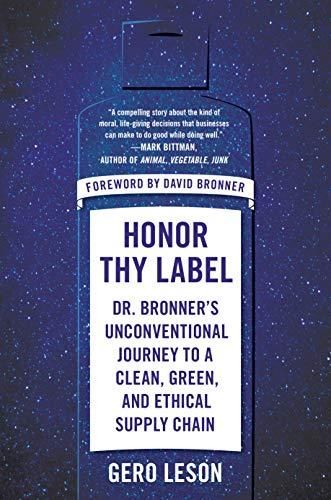Gero Leson details how Dr. Bronner’s Magic Soaps lives up to its goals of minimal carbon use and an organic, Fair Trade, regenerative supply chain.

All-One Capitalism
Gero Leson, vice president in charge of Special Operations at Dr. Bronner’s Magic Soaps, details how the company established an organic, fair trade and regenerative supply chain. Dr. Bronner’s set up private ventures and partnerships worldwide to produce olive, palm, coconut and mint oils. The company requires its farmers to adopt organic techniques, apply farming methods that enrich the soil, and avoid synthetic pesticides and fertilizers. In return, it guarantees farmers a profit and a fair trade premium that funds local improvements.
Unconventional Business
When Emanuel Bronner founded Dr. Bronner’s Magic Soaps in 1948, he saw his products as vehicles for promoting world peace. His labels featured dense text expounding his “All-One” philosophy. He manufactured Dr. Bronner’s branded liquid, peppermint soaps that did not use synthetic ingredients.
[Amid] growing awareness of humanity’s destruction of the natural world, the counterculture of the 1960s embraced both Emanuel’s natural, biodegradable soap and the message on its label.Gero Leson
Bronner’s sons, Ralph and Jim – along with Jim’s wife Trudy and their sons Mike and David, who became president of the company – dedicated the organization to doing good while remaining profitable, a goal Emanuel Bronner seldom achieved.
Dr. Bronner’s placed a limit on executive pay: No executive can earn more than five times the amount any full-time warehouse worker earns. Between 2014 and 2019, Dr. Bronner’s donated 7.6% of its total revenue to animal welfare, community improvement, criminal justice reform, fair pay, fair trade and regenerative organic agriculture.
In the early 2000s, the company launched an initiative to increase its use of organic coconut, palm, olive and mint oil. In 2004, company president David Bronner asked: Are farmers making a profit? Do they treat their workers fairly? Does the company’s production benefit or harm local communities?
Fair Trade Certification
Fair trade involves forming business relationships between Northern Hemisphere buyers and Southern Hemisphere producers. Commodities sell at a minimum price worldwide ensuring that farmers earn a profit and are able to survive price collapses. The fair trade purchase price includes a premium for community improvement initiatives. Trade occurs only between buyers and farmers who belong to democratically run cooperatives.
The Bronners’ vision was a transparent and beneficial supply chain – which naturally began with shifting all major and several minor raw materials to organic and fair trade sources.Gero Leson
Dr. Bronner’s added the goal of regenerative agriculture – by using crop and livestock farming techniques that promote species biodiversity and produce organic matter that enriches the soil.
Sri Lanka
Dr. Bronner’s built a Sri Lankan operation from scratch, converting farmers to organic practices while designing and building a coconut oil factory. When the production plant, offices and wastewater treatment facility were ready in 2009, the company hired 200 staff members and recruited 700 farmers.
The project achieved a high level of sustainability by mandating growing and processing practices that use no harmful chemicals. It uses coconut shells to fuel the boiler that runs the drying machines and sells the outer husks to fiber manufacturers or uses them as mulch.
All fair trade projects should be executed as if they were commercial projects, with budgets and deadlines.Gero Leson
The mill’s customers pay an added fair trade premium – 10% of the cost of the coconuts and non-executive labor – that supports community development projects, including a shelter and vocational training center for abused girls as well as supplies and infrastructure for rural elementary and middle schools.
Palm Oil
Most palm oil producers grow on clear-cut or forest land destroyed by fire. The governments of tropical countries encourage this destruction because palm oil brings in necessary revenue.
In 2004, a coalition of producers, traders, banks, investors, consumer brands and NGOs formed the Roundtable for Sustainable Palm Oil. Now 4,500 members strong, it enforces standards of orchard conditions and practices. The organization so far certifies only about 20% of global palm oil production.
Dr. Bronner’s formed an organization named Serendipalm to produce organic and fair trade palm oil in Ghana. The company hoped that by employing innovative farming techniques, it could boost yields without contributing to deforestation. It partnered with the local NGO Fearless Planet, which had been working on setting up a woman-led palm oil project. Dr. Bronner’s provided training and financial support and Fearless Planet offered farmers no-interest microloans to buy higher-quality seedlings.
High productivity per area has made [dynamic agroforestry] and other mixed agroforestry systems the darlings of people promoting tree planting to combat climate change.Gero Leson
Dr. Bronner’s sought to integrate its regenerative palm farming with cocoa farming. The company embraced “dynamic agroforestry,” which mimics natural tropical forest diversity with fields growing bananas, papayas, cocoa, oil palms, cashew nuts and fruit in rows or grid patterns.
Sustainability Projects and Partnerships
In 2015, Dr. Bronner’s set up an organic mint oil production partnership, Pavitramenthe, in India. It also purchased a Fair for Life coconut business in Kenya.
Finding the balance between encouraging responsible, democratic and community-focused behavior and making sure ‘things get done’ is a never-ending challenge in fair trade.Gero Leson
Dr. Bronner’s then started a dynamic agroforestry joint venture with Pacific Oil, the Samoan coconut oil producer, that produces cocoa, vanilla and turmeric.
Regenerative Agriculture
Regenerative practices could make farming a net carbon sink. Some 700 US companies have joined the Climate Collaborative, which is dedicated to cutting greenhouse emissions, sequestering CO2 and reducing waste.
Dr. Bronner’s intends to achieve a zero release of net greenhouse gases by 2025. It purchases power from renewable sources, and it uses energy-efficient transportation and a solar thermal system at its Vista, California factory.
Being good will cost you money, but in the long run, it will raise profitability through improved motivation and efficiency, increase sales without expensive advertising, lower the cost of energy, and more.Gero Leson
In 2015, Dr. Bronner’s became a Certified B Corporation, joining a coalition of 3,500 companies which meet aggressive standards for ethical and environmental operations and accountability. These companies represent more than 100 industries.
Sustainability
Leson provides a comprehensive blueprint for international sustainable practices as he delves into the very model of a company attempting to do social and environmental good and still make money. His style incarnates the Dr. Bronner’s gestalt: Friendly, intelligent, unpretentious, practical and, beneath a superficial idiosyncrasy, grounded in real-world concerns and solutions. The firm is no longer the hippie-dippie business it may have been at the beginning, though it retains the benevolent aspects of that attitude. Leson illuminates how the company now is fully adult and responsible – a tested and proven sustainability champion.
Other works on sustainable practices include Brewing Justice: Fair Trade Coffee, Sustainability, and Survival by Daniel Jaffee; The Better World Shopping Guide: Every Dollar Makes a Difference by Ellis Jones; and Beyond Fair Trade: How One Small Coffee Company Helped Transform a Hillside Village in Thailand by Mark Pendergrast.









